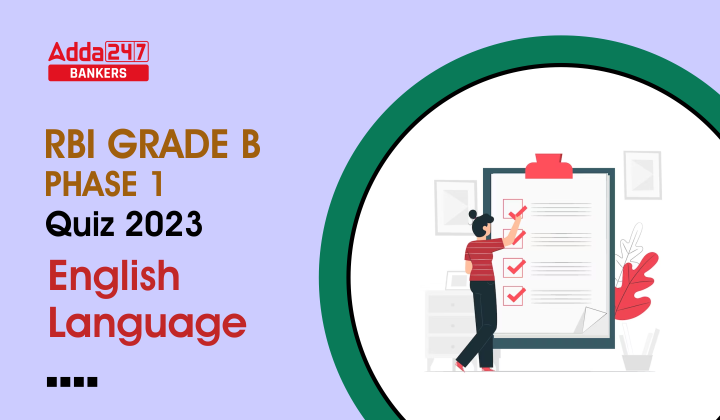Directions (1-5): Rearrange the following sentences (A), (B), (C), (D), (E), (F), and (G) in the proper sequence to form a meaningful paragraph; then answer the questions given below them.
(A) The merchant and his donkey were walking along together. They had not walked far when they reached a river on the way.
(B) There was nothing the merchant could do except return home, where he loaded his donkey with more bags of salt. As they reached the slippery riverbank again, the donkey fell into the river, this time deliberately. Thus the salt was wasted again.
(C) One beautiful spring morning, a merchant loaded his donkey with bags of salt to go to the market, in order to sell the salt.
(D) The merchant laughed at the donkey and said, “You foolish donkey, your trick has been discovered. You should know that you cannot fool anyone too many times.”
(E) By now the merchant knew the donkey’s trick. He wanted to teach the animal a lesson. As he returned home the second time with the donkey, the merchant loaded bags of sponges on its back.
(F) The duo set out on their trip to the market a third time. On reaching the river, the donkey very cleverly fell into the water again. But now, instead of the load becoming lighter, it became heavier.
(G) Unfortunately, the donkey slipped and fell into the river. As it scrambled up the bank of the river, it noticed that the bags of salt loaded on his back had become lighter.
Q1. Which of the following should be the FIRST sentence after rearrangement?
(a) A
(b) D
(c) B
(d) C
(e) G
Q2. Which of the following should be the THIRD sentence after rearrangement?
(a) B
(b) A
(c) G
(d) F
(e) E
Q3. Which of the following should be the SECOND sentence after rearrangement?
(a)A
(b) F
(c) D
(d) G
(e) E
Q4. Which of the following should be the FIFTH sentence after rearrangement?
(a) E
(b) B
(c) F
(d) C
(e) G
Q5. Which of the following should be the SEVENTH (LAST) sentence after rearrangement?
(a) G
(b) F
(c) E
(d) D
(e) B
Directions (6-10): Each question below has two blanks, each blank indicating that something has been omitted. Choose the set of words for each blank that best fits the meaning of the sentence as whole.
Q6. She was a/an ____________ liar who had mastered the art of making untrue statements in a manner that sounded ____________.
(a) Congenial, creditable
(b) Incorrigible, plausible
(c) Convincing, illogical
(d) Blatant, incongruous
(e) sordid, moronic
Q7. Physicians may soon have ………. to help paralysed people move their limbs by bypassing the ………. nerves that once controlled their muscles.
(a) instruments, detrimental
(b) ways, damaged
(c) reason, involuntary
(d) impediments, complex
(e) apparatus, disturbed
Q8. The internet is a medium where the users have nearly ……… choices and ………. constraints about where to go and what to do.
(a) unbalanced, non-existent
(b) embarrassing, no
(c) unlimited, minimal
(d) choking, shocking
(e) maximum, few
Q9. Environmental studies ………… an essential part of school education and they should be ………. to young children as well.
(a) cover, inculcated
(b) comprise, given
(c) constitute, imparted
(d) include, provided
(e) makes, bestowed
Q10. The different moods of the subjects had a direct ………. not only on what was observed but, even more ………, on the meaning of what was perceived.
(a) effect, strongly
(b) impact, than
(c) power, what
(d) understanding, accurately
(e) affect, hugely
Solutions
S1. Ans. (d)
Sol. The correct sequence is CAGBEFD
S2. Ans. (c)
Sol. The correct sequence is CAGBEFD
S3. Ans. (a)
Sol. The correct sequence is CAGBEFD
S4. Ans. (a)
Sol. The correct sequence is CAGBEFD
S5. Ans. (d)
Sol. The correct sequence is CAGBEFD
S6. Ans. (b)
Sol. ‘Incorrigible, plausible’ is the correct choice for the given question.
Incorrigible means (of a person or their behavior) not able to be changed or reformed.
S7. Ans. (b)
Sol. ‘ways, damaged’, fits the tow blanks perfectly.
S8. Ans. (c)
Sol. ‘unlimited, minimal’ fits the two blanks most perfectly.
S9. Ans. (c)
Sol. To ‘constitute’ is to ‘make up’; to comprise is to ‘contain’ or ‘include’. Moreover ‘inculcated’ in option (a) should be followed by ‘into’ and not ‘to’.
S10. Ans. (a)
Sol. ‘Even more than’ or ‘even more what’ do not work as short phrases.





 English Language Quiz For Bank Foundatio...
English Language Quiz For Bank Foundatio...
 English Language Quiz For Bank Mains Exa...
English Language Quiz For Bank Mains Exa...





